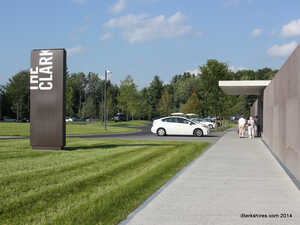Clark Art Hosts Virtual Talk on 18th Century French Drawings
WILLIAMSTOWN, Mass. — On Wednesday, Feb. 1, the Clark Art Institute joins with the Association of Historians of Nineteenth-Century Art to discuss the Institute's current exhibition, "Promenades on Paper: Eighteenth-Century French Drawings" from the Bibliothèque nationale de France.
Focusing on select drawings from the exhibition, curators Esther Bell, Anne Leonard, and Sarah Grandin offer a varied and lively picture of artistic practices in the years leading up to and just after the French Revolution.
The virtual talk takes place at 7 pm on Zoom.
According to a press release:
Over centuries, the Bibliothèque nationale de France (BnF) has sought to assemble the most complete holdings of textual and visual sources in France. The works on display at the Clark constitute the first public exhibition ever presented of the BnF's eighteenth-century drawings collection and span subject areas including natural history, current events, design, landscape, portraiture, and much more. Running throughout the exhibition is the theme of the promenade, or stroll, centered on the experience of an individual beholder. In the eighteenth century, the public promenade emerged as a site of urban leisure in which a blend of social classes could engage in the pleasures of spectatorship. The activities of walking, looking, and sketching were closely related and often intertwined.
Free. Presented as part of the AHNCA/Dahesh Virtual Salon series. Advance registration for the Zoom transmission is required. Registrants will receive a private Zoom link via email prior to the event. For more information and to register, visit
clarkart.edu/events.
"Promenades on Paper: Eighteenth-Century French Drawings" from the Bibliothèque nationale de France is co-organized by the Clark Art Institute, Williamstown, Massachusetts, and the Bibliothèque nationale de France, Paris. It is curated by Esther Bell, Deputy Director and Robert and Martha Berman Lipp Chief Curator; Sarah Grandin, Clark-Getty Curatorial Fellow; and Anne Leonard, Manton Curator of Prints, Drawings, and Photographs from the Clark, and by Corinne Le Bitouzé, Conservateur général; Pauline Chougnet, Conservateur en charge des dessins; and Chloé Perrot, Conservateur des bibliothèques from the Bibliothèque nationale.
This exhibition is made possible by Jessie and Charles Price. Major funding is provided by Elizabeth M. and Jean-Marie Eveillard, the Getty Foundation through its Paper Project initiative, and the Samuel H. Kress Foundation. The exhibition catalogue is made possible by Denise Littlefield Sobel.
Tags: Clark Art,

